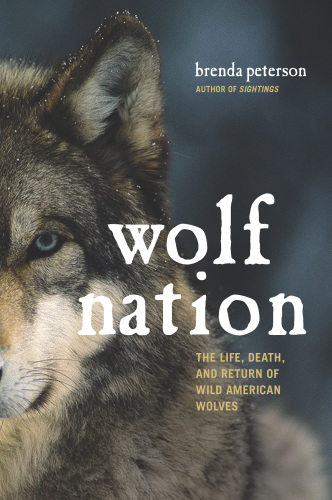
Wolf Nation
The Life, Death, and Return of Wild American Wolves
کتاب های مرتبط
- اطلاعات
- نقد و بررسی
- دیدگاه کاربران
نقد و بررسی

April 1, 2017
Blending solid history with on-the-ground reportage, natural history writer Peterson (Wolf Haven: Sanctuary and the Future of Wolves in North America, 2016, etc.) turns in a spirited defense of Canis lupus. The war on wolves is an ancient one. In the American West, where the author lives, ranchers fear wolves for their supposedly ravenous, profit-reducing hunger; elsewhere, wolves have been made into fairy-tale monsters. Against such cliches, Peterson serves up a few of her own, including the old saw about superior Native American wisdom in asking, "who speaks for wolf?" and the rather obvious nostrum, "to declare a person or an animal an enemy requires dehumanizing the other." Much of the spiritual ground, so to speak, that she covers has already been explored in better books by Barry Lopez and Peter Matthiessen, while Thomas McNamee and Rick McIntyre (who makes an appearance here) have done more comprehensive work in studying the fate of the wolf population of Yellowstone National Park. Yet, while she does not surpass them, Peterson adds important information, including her account of the recently articulated mechanisms of "trophic cascades," by which wolves are seen to have large implications for the health of wild ecosystems. "We are just beginning to understand wolf biology," she writes before examining some of those implications as they center on the fate of one fallen wolf. Often, Peterson's passing observations are as useful as the data she presents on wolves themselves. For instance, she notes, hopefully, that the millennial generation, though not identifying as "environmentalists" strictly speaking, are "the most environmental generation ever," supporting clean energy, strong regulatory programs, wilderness protection, and, yes, wolf reintroduction. There are other good takeaways here as well, including a lively discussion of why wolves howl and what kind of "vocabularies" they employ when doing so. Though with some overlap with the existing literature, a useful survey of the current state of all matters lupine.
COPYRIGHT(2017) Kirkus Reviews, ALL RIGHTS RESERVED.

Starred review from April 1, 2017
A veteran of the "wolf wars," Peterson (Sightings: The Gray Whale's Mysterious Journey) draws on her own deep experience and artfully mixes it with science, history, and Native American lore to create a rich account of a most enigmatic creature. She fully explores lupine biology and ethology, and chapters devoted to two famous wolves, "06" and "OR-7" (aka "Journey"), complement that information. Readers learn how apex predators benefit ecosystems, and witness reintroduction in progress with Mexican gray wolves. Although the author leaves no doubt as to where her sympathies lie, she spends time with hard-core opponents to wolf conservation as well as with hunters and ranchers who are warming to the idea. Readers get an aching sense of what Canis lupus is up against--two-legged mammals with guns, of course, and, behind them, state wildlife commissions stacked with hunter-members gung-ho about removing wolves' protected status. Equally malignant, Peterson says, is the negative mythic weight of imported big bad wolf fables and homespun Old West tales of the animal as public enemy. Her book stands as a wise and potent antidote. VERDICT Highly recommended for most public libraries and readers interested in the natural world. An accessible, worthy update to classics such as those by Farley Mowat and Barry Lopez.--Robert Eagan, Windsor P.L., Ont.
Copyright 2017 Library Journal, LLC Used with permission.

April 15, 2017
Wolves are terrorists on the order of Osama bin Laden, the Anti-Wolf Coalition would have us believe, yet a hunting family carries a sign, Real hunters don't kill wolves. This dichotomous relationship with Canis lupus fills Peterson's (Wolf Haven, 2016) history of the 300-plus-year association of wolf and human in North America. She also weaves in her own tale: raised in a National Forest (her father became head of the U.S. Forest Service) and a child of the utilitarian branch of conservation, she became a journalist and embraced the environmentalist side. As Peterson explores the story of the wolf in America, she reports on the battle over aerial hunting of wolves and the highly successful reintroduction of wolves to Yellowstone. She follows the first wolf family to breed in Oregon since the 1940s and looks at how sheep ranchers in Idaho have learned to coexist with resident wolf packs. In eloquent language, Peterson brings us to the truisms that not only does wilderness need wolves, but wolves must thrive to make the world whole again.(Reprinted with permission of Booklist, copyright 2017, American Library Association.)

























دیدگاه کاربران